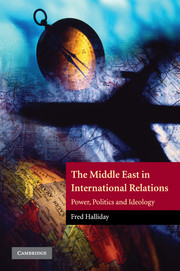Book contents
- Frontmatter
- Contents
- List of maps
- List of tables
- Acknowledgements
- Introduction: world politics, the Middle East and the complexities of area studies
- Part I Concepts, regions and states
- 1 International Relations theory and the Middle East
- 2 The making of foreign policy: states and societies
- Part II History
- Part III Analytic issues
- Part IV Conclusion
- Appendices
- Select bibliography
- Index
1 - International Relations theory and the Middle East
Published online by Cambridge University Press: 05 September 2012
- Frontmatter
- Contents
- List of maps
- List of tables
- Acknowledgements
- Introduction: world politics, the Middle East and the complexities of area studies
- Part I Concepts, regions and states
- 1 International Relations theory and the Middle East
- 2 The making of foreign policy: states and societies
- Part II History
- Part III Analytic issues
- Part IV Conclusion
- Appendices
- Select bibliography
- Index
Summary
Analysing the IR of the Middle East: five approaches
Theories are like mushrooms: they can be classified into three categories – ‘edible’, ‘poisonous’ and ‘indifferent’. The criteria for good or sound theory are evident enough: it should be conceptually clear and rigorous, historically aware, able to yield substantive analysis and research agenda, and, where appropriate, able to engage with ethical issues. Theory is a necessary part of all human understanding, from the numbers of mathematics or divisions into colours we use in everyday life to the abstractions of Hegel, or of the sociologist Talcott Parsons. This is not the issue. The issue, not least in an academic and policy climate where institutional interests, epistemological fashion and sheer competitive ambition all hold sway, is as with mushrooms to discern and hold to the difference between good, bad and harmless theory. Some is edible, some is indifferent, but some is definitely poisonous. Of all of this the study of the Middle East is far from being irrelevant.
As noted, International Relations theory, any more than any other branch of social science, is not about prediction, though like all human activities it may speculate, nor is it about the assertion of timeless, if sometimes nice, banalities about state behaviour. It is a discipline concerned with explanation, of historical events and processes, and with the examination, in theoretical and comparative vein, of the concepts underlying our understanding of global affairs.
- Type
- Chapter
- Information
- The Middle East in International RelationsPower, Politics and Ideology, pp. 21 - 40Publisher: Cambridge University PressPrint publication year: 2005

